高一下册 Module 3 Unit 1 The world of our senses Reading1
文档属性
| 名称 | 高一下册 Module 3 Unit 1 The world of our senses Reading1 |

|
|
| 格式 | zip | ||
| 文件大小 | 2.6MB | ||
| 资源类型 | 教案 | ||
| 版本资源 | 牛津译林版 | ||
| 科目 | 英语 | ||
| 更新时间 | 2016-08-10 00:00:00 | ||
图片预览




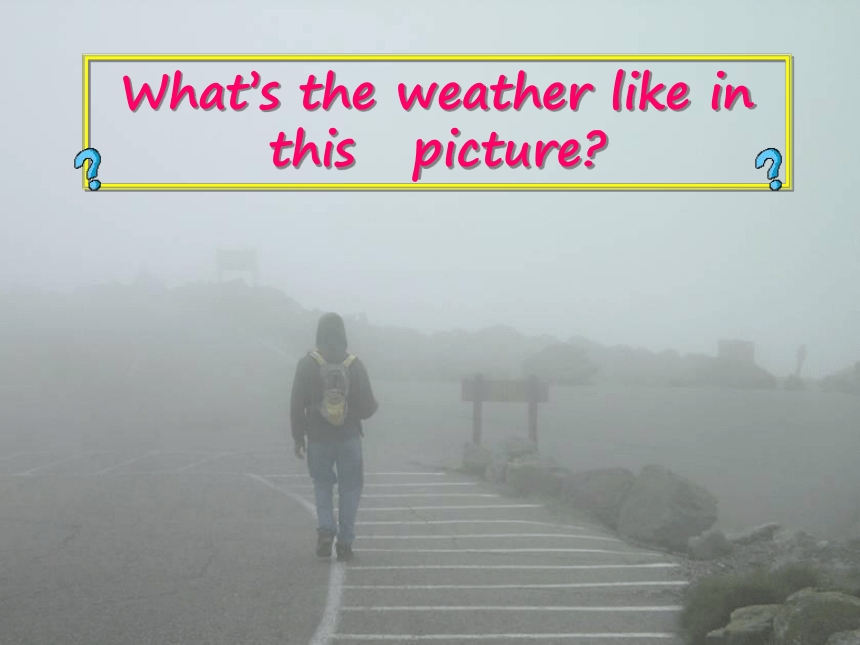
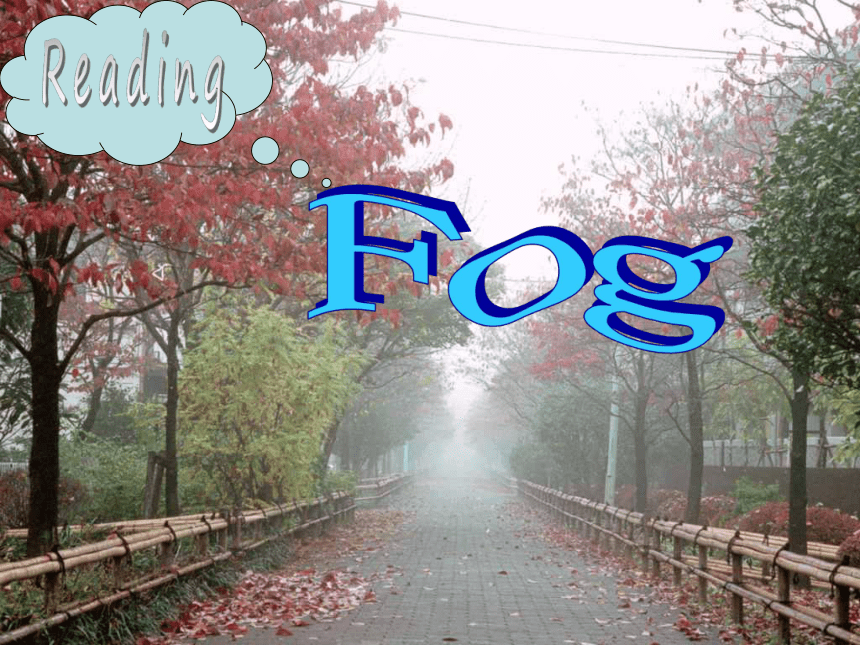
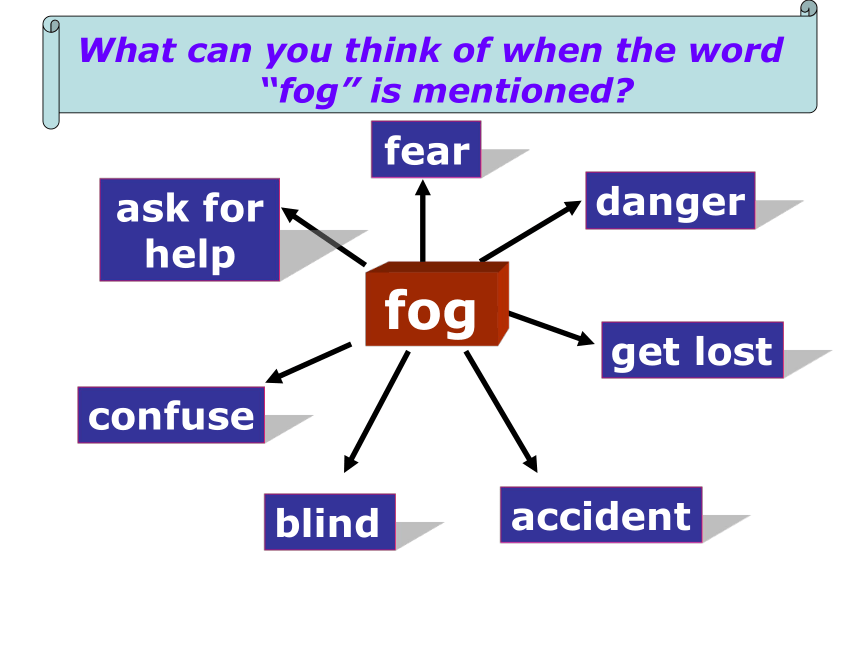
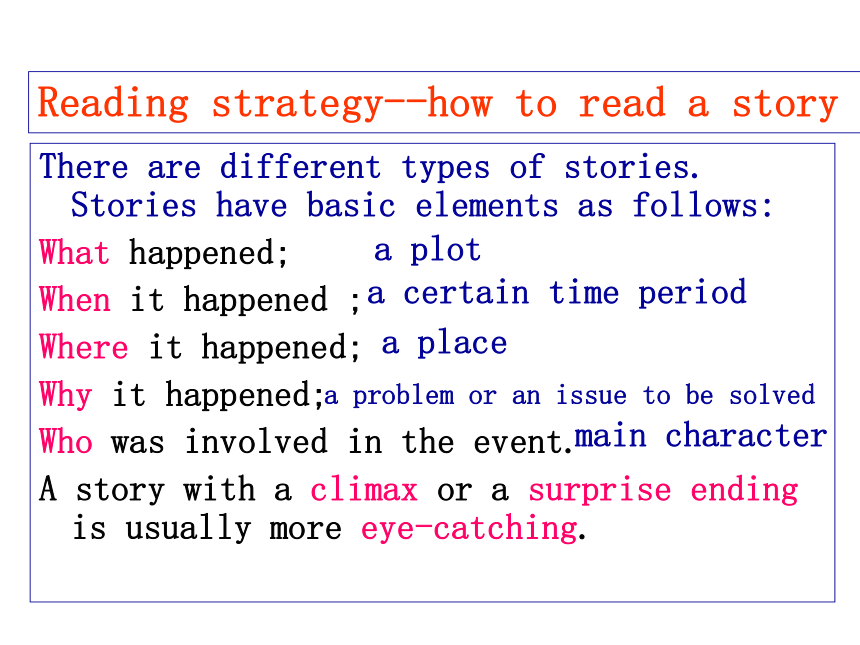
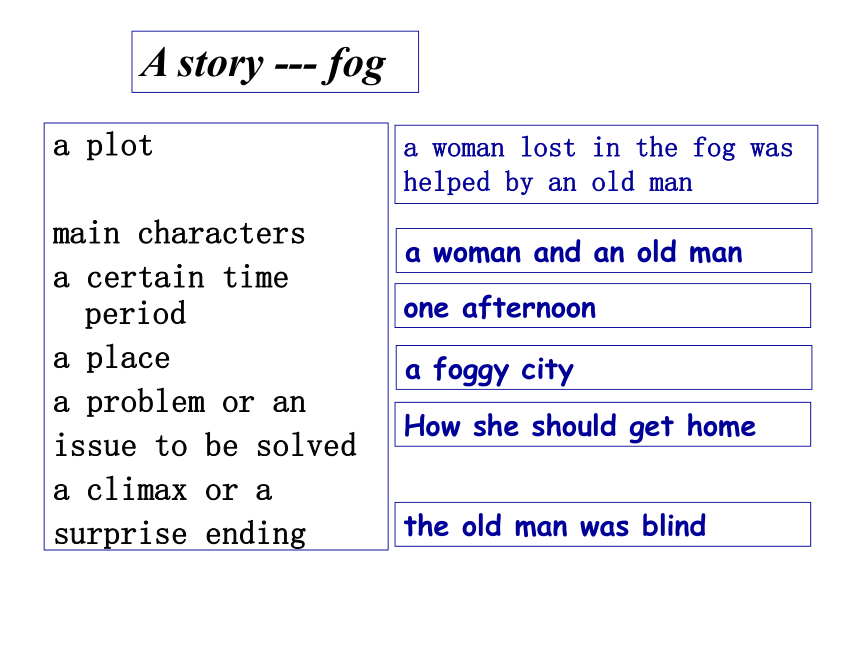
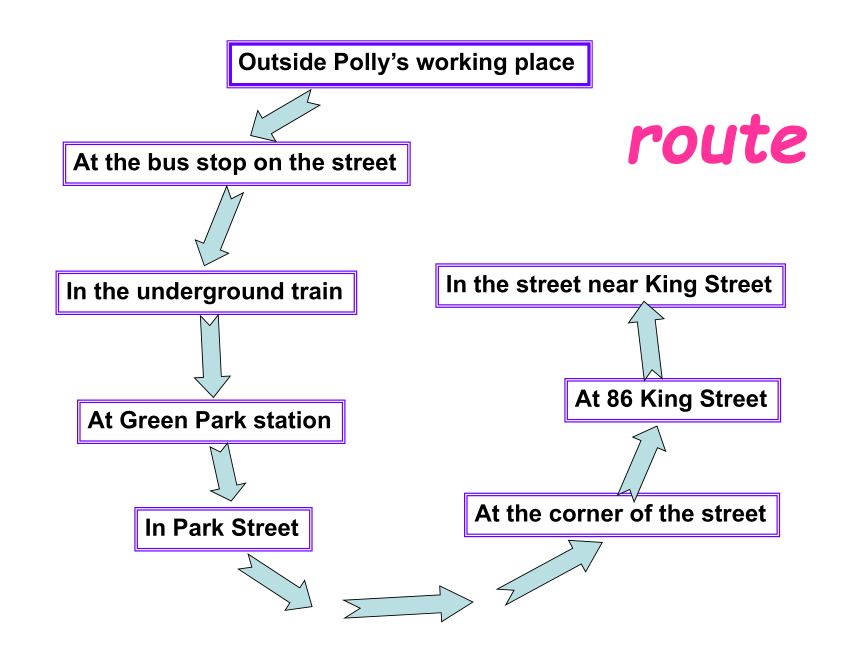
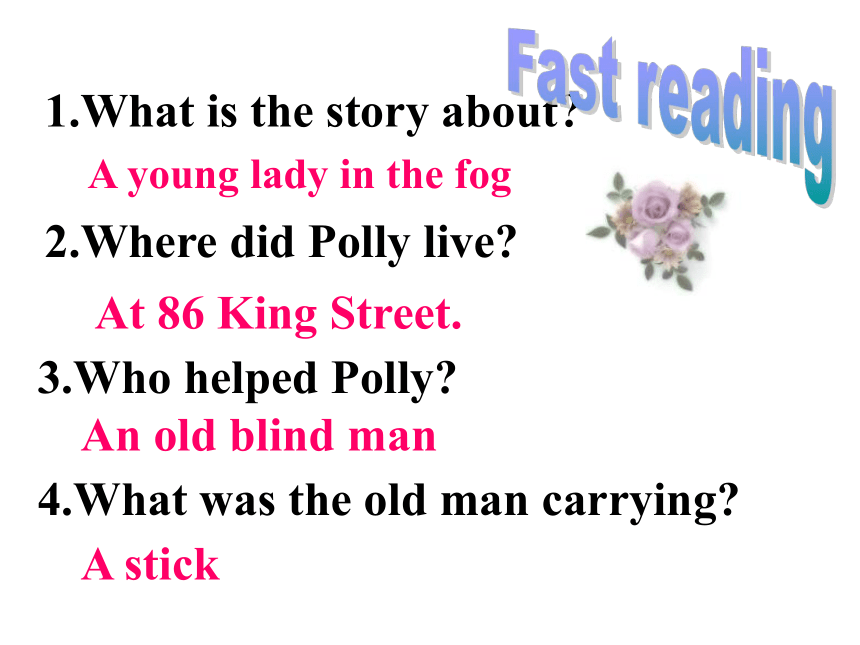

文档简介
课件68张PPT。The world of our sensesUnit 1What’s the weather like in this picture?FogReadingask for helpblindaccidentfearWhat can you think of when the word “fog” is mentioned?fogget lostdangerconfuseThere are different types of stories. Stories have basic elements as follows:
What happened;
When it happened ;
Where it happened;
Why it happened;
Who was involved in the event.
A story with a climax or a surprise ending is usually more eye-catching. a plota certain time perioda placea problem or an issue to be solvedmain characterReading strategy--how to read a storya plot
main characters
a certain time period
a place
a problem or an
issue to be solved
a climax or a
surprise endingA story --- foga woman lost in the fog was helped by an old mana woman and an old manone afternoona foggy cityHow she should get homethe old man was blindOutside Polly’s working placeAt the bus stop on the streetIn the underground trainAt Green Park stationIn Park StreetAt the corner of the streetIn the street near King StreetAt 86 King Streetroute 1.What is the story about? A young lady in the fog At 86 King Street.2.Where did Polly live?3.Who helped Polly? 4.What was the old man carrying? An old blind man A stick Fast readingFill in the following chart using the information you find in the story Fog to check your understanding of the story.Part Place Time &
weather Person What happened Polly's thought or feeling Part 1 Part 2 Outside Polly's work place Polly She left work early. She wondered if the bus would still be running. at the bus stop
in the street later Polly;
the bus
condu-
ctor The fog was too thick for the bus to run to King Street, where Polly lived. \At 4
p.m.
foggyPart Place Time &
weather PersonWhat happened Polly's thought or feeling Part 3Part4later Polly;
a tall man A tall man in a dark coat is on the train. She sensed she was being watched. In Park Street; at the corner of the street When Polly got to the station, the fog lay like a thick, gray cloud. Polly;
a man A rough hand brushed her face. Her heart was beating with fear. In the underground train; at Green Park stationPart Place Time &
weather Person What happened Polly's thought or feelingPart 5 Part 6in the street Polly;
an old man
The old man took her hand and helped her find the way. She wished for someone to come, along.
Fear held her still. She began to feel frightened again. outside Polly's house at King Street late that day
Polly; the old blind man The old man left to help more people in need.
Polly was thankful.
It was dark.Questions and answers1. Why did Polly leave work early?
2. Why did Polly take the Underground train to Green park?
3. What was the weather like outside the train station?Because there was a thick fog that afternoon and she wondered if the bus would still be running in the fog.Because the fog is too thick for the bus to go to King Street.The fog lay like a thick, grey cloud.4 According to lines 22-24, what made Polly afraid?
5. According to line 33, what did the man look like?
6. How could the man tell that Polly was young?The rough hand that brushed her face, and the man’s voice that was close to her ear made Polly afraid.He looked old.He could tell Polly was young by hearing her voice.Put these events in the correct order.1.Polly took an Underground train to Green Park .
2. An old man took Polly’s hand .
3. A hand reached out and touched Polly’s arm .
4. Polly thanked the blind man .
5. A tall man in a dark coat was watching Polly .
6. Polly and the old man turned left at the corner .
7. Polly felt frightened when a rough hand brushed
her face.
8. Polly got to King Street safely.
9. Polly left the office at four o’clock.
10. The old man went to help others .Deep understandingRead the story carefully and answer the following questions:1. (Lines 14-15) … she sensed that she was being watched by a tall man in a dark coat.Why was a tall man mentioned here?2. (Lines 22-23) … Polly felt a rough hand brush her face …Why did the man brush Polly’s face?The writer mentioned the two unnamed men in order to show that ______.
Polly was in danger.
they wanted to help her.
they would do something bad to her.
Polly was too nervous.D3. (Line 30) Polly waited. at last she spoke.The man offered to help her, but why did Polly wait?Post-reading activitiesRetell the story Fog with the help of the following chart.Outside Polly’s working placeAt the bus stop on the streetIn the underground trainAt Green Park stationIn Park StreetAt the corner of the streetIn the street near King StreetAt 86 King StreetLanguage points 1. Once out in the street, she walked quickly towards her usual bus stop. Once out in the street 相当于
Once she was out in the street ,时间状语从句
在条件/时间状语从句中,从句和主句的主语一致,且从句的谓语动词是be时,从句可省略主语和be动词。
First aid, if (it is) properly done, can save a person’s life.
When driving the car , you must be careful.
Once 可用作连词,一… 就 ; 一旦。
e.g 一旦出版,这本词典会非常畅销。
Once (it is ) printed, this dictionary will be very popular.
他一到我们就可以动身。
Once he arrives we can start.
Once可用作副词,意思为:一次 ;曾经。
Just for once he arrived on time.
只有这次他是按时到了.
This book was once famous, but nobody reads it today.
这本书从前很出名, 现在没人看了. 2. ‘Sorry, Miss,’ replied the man, ‘the truth is that the fogs is too thick for the bus to run that far.
句中第一个that引导的是表语从句。
问题是我们钱已用完了。
The problem is that we have run out of money.
第二个that (或this) 在此处等于so,意思是“那么”(或“这么”),修饰形容词或副词。
艰辛会使人变化那么大吗?
Can hard work change a person that much?
truth n 真相,真实; 真理
There’s no truth in what he says.
It’s a scientific truth.
to tell the truth 老实说,实话说
To tell the truth, I don’t agree with you.
in truth 真实地,事实上
It was in truth a wonder.
3. observe vt./ vi. 注意,观察到
Do you observe anything unusual in his behavior?
observe sb. doing sth.
do sth.
I observed the man walking up to the house.
He observed the girl open the door.
observe/see/watch/notice/look at sb do/doing…
listen to/hear sb do/doing … 人们常看到他乞讨
People often see him beg.
People often see him begging.昨天人们看到他乞讨的.
People saw him begged yesterday.He was seen to beg yesterday.(∨)(×)(×)(∨)5. rest n. 其他,其余(与the连用,表其余的人或物。 作主语时谓语的数由主语而定
Twenty students passed the exam and the rest failed.
Most water was polluted in the lake while the rest was still clean.
The rest of money__________ fifty dollars. (be)
The rest of students __________ girls. (be)
休息
have a rest/ take a rest are is rest v 停止活动或工作; (尤指)休息:
rest for an hour after lunch
午饭後躺下休息一小时
You should rest your eyes after a lot of reading.
长时间阅读後应该让眼睛休息一下.
依靠, 搁在
She rested her elbows on the table.
她把肘部靠在桌子上.
Rest the ladder against the wall.
把梯子靠在墙上. L16. ..the rest of..
L 32…his hand resting on her arm.
L50….and rest for a while?
9. beat vi. (心脏、脉搏)跳动;敲打;打败
waves beat the shore.
You can hear his heart beating.
We beat them by the score of 5 to 3.
区别:hit, strike, beat
beat 强调“连续不断地打”;hit 表示“击中”,“打了一下”,通常是一次性的动作;strike着重“敲,敲打”。 He feels very excited and his heart ____ very fast.
A. is striking B. is beating
C. is hitting D. knocks
BB When the church clock ____ twelve, we realized it was too late. We were ___ by his speech.
A. hit; attracted B. struck; struck
C. knock; attracted D. beat; struck10. fear n. & vi. 害怕,恐惧
fear to do sth.
doing sth.
She feared to swim in the river.
My son fears staying at home alone at night.
I feared that they would misunderstand me.
for fear that… 惟恐,以防
Take an umbrella with you for fear that it might rain.in fear of … 惧怕
The step-mother was cruel and the children were in fear of her.11. wish for 期盼,盼望
On his birthday he wished for his girlfriend to attend his birthday party.
12. still adj. 静止的,不动的
Please keep still while I fasten your shoe.
区分:silent, quiet, still, calm
silent 多用于人,指没有声音或不讲话。
quiet “安静的,宁静的”,强调“安静”,没有声音,不吵闹或心里没有烦恼或焦虑。
still 指“不动的,寂静”,强调“静止的状态”,它不能用语心理上的安静,只用于物理上的安静,指没有运动或动作的状态。
calm指平静的,沉着的,指无风或人的心情不激动,沉着镇定。The waters of the lake were so ____ that it looked like glass.
A. silent B. calm C. still D. quiet13. stare vi. 凝视,盯着看
stare at sb./ sth.
It’s rude to stare at sb.
stare sb. into sth. 盯者某人使其做出某种反应
She stared him into silence.
区分:glance at, stare at, look at, glare at
glance at 指用眼睛瞥或扫视;stare at 指由于好奇、无礼、傲慢而睁大眼睛凝望、盯着或瞪着看;
look at 没有任何感彩,意思是“看着”;
glare at 指由于愤怒而瞪着或怒视。
It’s impolite to stare at people.
Please look at your watch and tell me what time it is.
He glanced at the person and walked away quickly.
He glared at the boy angrily.She ____ shyly at him out of the corners of her eyes.
A. stared B. glared
C. glanced D. watched5. Now she wanted to run, but fear held her still.
hold 在句中的意思是“使身体保持某种姿势
(put or keep part of body in a certain position)。
The dog held its tail between its legs.
宝宝能自己站立了吗?
Can the baby hold herself up yet?
2. Please hold ___ your head high.
He held ____his hand for money.
She can’t hold ____ her tears.
The accident held ___ the traffic.
Please hold ___. I’ll ask him.
He always holds ___his view.
The rain held ___ till evening.
We hold the view that he does wrong.
His view can’t hold water. 高昂起头伸出阻止阻挡, 使停顿别挂下坚持( 方向, 原则)拖延, 不接近认为(理论)站得住脚; (容器)不漏水upoutbackupontooff2. (L31) Polly found herself staring up at a man standing with his hand resting on her arm.
★a man ____ _____ standing with…
★ found herself staring up at a man
“ find oneself diong sth/ done
.. .. in/on a place” Eg. When he woke up, he found himself lying under the bed.
After he came to, he found himself tied to a tree.
The Lady in white found herself in a
beautiful valley.
(无意中) 发现自己在…who was★ …standing with his hand resting on her arm.我环视四周,却发现自己在绿树丛中.I looked around and found myself surrounded by trees.Verb + with phrase “做…时伴随着...(动作/状态)发生/存在
With+ N.+ doing/done/prep./advEg. He stood there with his eyes looking at the dog.
The guy entered the room with his hands tied back.
We are having a lesson with a cat in the room.
She slept there with the window open.
The Emperor walked in the street with nothing on.7. …standing with his hand resting on her arm.Eg. He stood there with his eyes looking at the dog.
The guy entered the room with his hands tied back.
We are having a lesson with a cat in the room.
She slept there with the window open.
The Emperor walked in the street with nothing on.Verb + with phrase “做…时伴随着...(动作/状态)发生/存在
With+ N.+ doing/done/prep./adv5.A few seconds later, a hand reached out and touched her arm. reach vt. & vi. 1. stretch out: He reached out for the knife, but it was too far away. He reached out for the dictionary. 2. get to, go as far as: Can you reach the branch with those red apples? Not a sound reached our ears.
The heat of summer has reached its climax.
The two sides were unable to reach agreement.
be out of reach of sb./be out of sb.’s reach 在某人够不到的地方
beyond [above, out of] one's [the] reach 达不到的, 力所不及的; 不能理解
make a reach for (sb / sth.) 伸出手; 企图抓住...
within easy reach of 在容易达到...的地方; 在...的附近
within sb.'s reach 在某人力所能及的范围内, 在某人能到达的范围内
高考链接
Let’s keep to the point or we ____ any decisions. (2004全国)
??? A. will never reach
??? B. have never reached?
??? C. never reach
??? D. never reached
A8. Watch out for the step here.
watch out for 戒备, 提防, 密切注意。
Watch out for a tall man in a black hat.
你要小心这一带快速行驶的车辆。
You have to watch out for fast traffic along here. 6. It gives me the chance to pay back the help that people give me when it’s sunny. pay – paid - paying
vt. & vi. 1. give (sb.) money for goods, service, etc. You must pay me what you owe. Do you know the television commercials promoting an automotive oil filter that featured the statement “You can pay me now, or pay me later”? pay sb. off /pay for What if my customer doesn't pay their bill? How can I pay you back for all your kindness? Does it pay to grow fruit for the market? He says that sheep farming doesn’t pay.
It pays me to keep that stock.
It will pay in the long run if the setting off of firecrackers is effectively banned in the cities.
14. watch out for 留心,留意,密切注意
You better watch out for the mad street dog in this area. 你最好留心這一區街上的流浪狗。 Watch out! Those bricks are falling off. 小心!那些磚塊要掉下來了。
15. be frozen with 由于……而呆住
The noisy class were frozen with the teacher’s single look.16. related adj. 和……相关的,有联系的
相关搭配:
(1)relate to
①能理解或同情某人/某事物
Some adults can’t relate to children. 有些成年人不理解孩子的想法。
②关系到,涉及到The letter related to the sale of the house. 这封信涉及房子的出售。(2)relate…to… 向……讲述;把……和……联系起来
If you relate the results to the cause, you will find things are not that simple.
(3)be related to 与……相关
Wealth is seldom related to happiness. 财富鲜与幸福相关。The theme of the dialogue should be ____ to the theme of the reading passage.
A. related B. called
C. joined D. checked 17. add vt. 补充说;补充,添加
区别add…,add…to…,add to…和add up to:⑴ add表示补充说明。
“At your age you should give all your attention to your studies,”her father added. 她父亲又说:“像你这样的年纪应当把精力都放在学习上。”
⑵ add…to…意为:把某事物(或数量)加在另一事物(或数量)上。
He added another book to his library. 他又增加了一本藏书。
⑶ add to意为“增加了”。
He did nothing but add to our trouble. 他什么也没干,只是增加了我们的麻烦。
Fireworks added to the attraction of the festival night. 烟火使节日之夜更加生色。
⑷ add up to意为“总共达,加起来达到”。
The cost of two trips added up to 1000 dollars. 两次旅行的费用总计在1000美元。That is the very coin I need to ____ my collection.
A. add up B. add in
C. add on D. add to
The tower on the top of the hill_____________ the beauty of the lake.
A. adds up to????? B. adds to??????????
C. adds up???????? D. adds18. link vt.& vi. 联系,相关联;连接
The road links all the new towns.
be linked to 和…….有关系,和……有联系的
The person in black is linked to the case.
19. make the most of 充分利用,相当于make full use of/make the best of
One should always make the most of one's opportunity.
谁都应该充分利用自己的机会。
而make much of 则是“充分重视”的意思。
I could make much of what he said.我还是充分重视他说的话。20. touch
⑴ touch作名词可表示“接触;触”。
I felt a touch on my arm. 我觉得有人碰了我胳膊一下。
⑵ touch作及物动词可以表示“触摸;使接触;感动”等意思。
One of the branches of the tree is touching the water. 有一根树枝碰到了水面。
We were greatly touched by her story. 她的故事深深地打动了我们。
⑶ touch作名词时还可构成以下短语:
① get in touch with... “与……取得联系”。 I really don't know how to get in touch with her. 我的确不知道如何同她取得联系。
② keep in touch with... “与……保持联系”。
How long have you kept in touch with him? 你同他保持联系多久了?
③ lose touch with... “同……失去联系”。
I don't know you have lost touch with her. 我不知道你同她失去了联系。
It was in 2000 that I lost touch with her. 我是在2000年同她失去联系的。
④ be out of touch with…
I have been out of touch with Tom for two years. Here is my card. Let's keep in ________.
A. touch B. relation
C. connection D. friendship
We _____ with each other ever since we met three years ago.
A. got in touch with
B. have stayed in touch with
C. have got in touch with
D. kept in touch with 21. deep / deeply
deep和deeply一样,也可用作副词,但两者在具体的用法上有很大差异,指动作或事物的实际深度时,较多地用deep。 They are digging deep to find water. The ship sank deep in the sea. My father often works deep into the night. 与介词into短语连用时,一般用deep,而不deeply用;
deeply较多地用于喻义,尤指情感的深度,这时一般不用副词deep。 be deeply interested in
hurt sb deeply deeply regret be deeply in love with be deeply moved 形容词deep除表示物体的深度以外,可以用来指物体的纵深,睡眠的深沉,悲痛的深切,工作的专心。
ten meters deep
deep in the woods be in a deep sleep
take a deep breath be in deep sorrow
deep in thought23. likely adj. 可能的
sb. / sth. is likely to do sth.
It’s likely to do sth. /that …
You are likely to do win.
It is likely for you to win.
It is likely that it will rain.
When she woke up, she realized that things she had dreamed of could not ___ have happened.
A. Possibly B. likely
C. hardly D. usually
It’s very____ that, in many schools, students are going to spend less time in the classroom than they used to do.
A. possibly B. probably
C. lovely D. likely
Look at the clouds in the sky. ____, it will rain soon.
A. Likely B. Seem
C. Possible D. Probably 24. wound n.伤口,创伤
vt. 使受伤
比较:hurt, injure, wound
hurt 作及物动词时指精神上或肉体上的"创伤;伤害"。
His words hurt me / my feelings. 他的话伤了我/我的感情。
He fell and hurt his leg. 他掉下来伤了腿。
injure指意外伤害或事故造成的"伤害",
Several children were injured in the accident. 好几个孩子在那次事件中受伤。
wound一般指"刀伤;枪伤;战场上受伤"。
He got wound in the battle. 他在战争中受伤了。What he said ____ me and I got angry. A. broke B. hurt
C. wounded D. damaged What you said is too much for her. It ____ her deeply.
A. hurted B. hurt
C. injured D. wounded
---Jack fell off a ladder yesterday, but he’s all right.
---He’s lucky. He ______himself badly.
A. could wound
B. could have wounded
C. could hurt D. could have hurt25. avoid 避免(后接动词或名词):
He tried to avoid answering my questions.There was a large box behind the door and Peter couldn't _____ falling over it in the darkness.
A. help B. resist
C. avoid D. prevent26. stick
表示"刺;戳;刺死",后面接名词,且与介词into连用。
She stuck some pins into the material. 她往布料中刺了几根饰针。
表示"张贴;粘贴",后面接名词。
I forgot to stick a stamp on the letter.我忘了在信上粘贴邮票。
表示"坚持;停留",与介词to连用,后面接名词、动名词、代词或宾语从句。
I decided to stick to my present job.我决定把现在的工作坚持做下去。Thanks
What happened;
When it happened ;
Where it happened;
Why it happened;
Who was involved in the event.
A story with a climax or a surprise ending is usually more eye-catching. a plota certain time perioda placea problem or an issue to be solvedmain characterReading strategy--how to read a storya plot
main characters
a certain time period
a place
a problem or an
issue to be solved
a climax or a
surprise endingA story --- foga woman lost in the fog was helped by an old mana woman and an old manone afternoona foggy cityHow she should get homethe old man was blindOutside Polly’s working placeAt the bus stop on the streetIn the underground trainAt Green Park stationIn Park StreetAt the corner of the streetIn the street near King StreetAt 86 King Streetroute 1.What is the story about? A young lady in the fog At 86 King Street.2.Where did Polly live?3.Who helped Polly? 4.What was the old man carrying? An old blind man A stick Fast readingFill in the following chart using the information you find in the story Fog to check your understanding of the story.Part Place Time &
weather Person What happened Polly's thought or feeling Part 1 Part 2 Outside Polly's work place Polly She left work early. She wondered if the bus would still be running. at the bus stop
in the street later Polly;
the bus
condu-
ctor The fog was too thick for the bus to run to King Street, where Polly lived. \At 4
p.m.
foggyPart Place Time &
weather PersonWhat happened Polly's thought or feeling Part 3Part4later Polly;
a tall man A tall man in a dark coat is on the train. She sensed she was being watched. In Park Street; at the corner of the street When Polly got to the station, the fog lay like a thick, gray cloud. Polly;
a man A rough hand brushed her face. Her heart was beating with fear. In the underground train; at Green Park stationPart Place Time &
weather Person What happened Polly's thought or feelingPart 5 Part 6in the street Polly;
an old man
The old man took her hand and helped her find the way. She wished for someone to come, along.
Fear held her still. She began to feel frightened again. outside Polly's house at King Street late that day
Polly; the old blind man The old man left to help more people in need.
Polly was thankful.
It was dark.Questions and answers1. Why did Polly leave work early?
2. Why did Polly take the Underground train to Green park?
3. What was the weather like outside the train station?Because there was a thick fog that afternoon and she wondered if the bus would still be running in the fog.Because the fog is too thick for the bus to go to King Street.The fog lay like a thick, grey cloud.4 According to lines 22-24, what made Polly afraid?
5. According to line 33, what did the man look like?
6. How could the man tell that Polly was young?The rough hand that brushed her face, and the man’s voice that was close to her ear made Polly afraid.He looked old.He could tell Polly was young by hearing her voice.Put these events in the correct order.1.Polly took an Underground train to Green Park .
2. An old man took Polly’s hand .
3. A hand reached out and touched Polly’s arm .
4. Polly thanked the blind man .
5. A tall man in a dark coat was watching Polly .
6. Polly and the old man turned left at the corner .
7. Polly felt frightened when a rough hand brushed
her face.
8. Polly got to King Street safely.
9. Polly left the office at four o’clock.
10. The old man went to help others .Deep understandingRead the story carefully and answer the following questions:1. (Lines 14-15) … she sensed that she was being watched by a tall man in a dark coat.Why was a tall man mentioned here?2. (Lines 22-23) … Polly felt a rough hand brush her face …Why did the man brush Polly’s face?The writer mentioned the two unnamed men in order to show that ______.
Polly was in danger.
they wanted to help her.
they would do something bad to her.
Polly was too nervous.D3. (Line 30) Polly waited. at last she spoke.The man offered to help her, but why did Polly wait?Post-reading activitiesRetell the story Fog with the help of the following chart.Outside Polly’s working placeAt the bus stop on the streetIn the underground trainAt Green Park stationIn Park StreetAt the corner of the streetIn the street near King StreetAt 86 King StreetLanguage points 1. Once out in the street, she walked quickly towards her usual bus stop. Once out in the street 相当于
Once she was out in the street ,时间状语从句
在条件/时间状语从句中,从句和主句的主语一致,且从句的谓语动词是be时,从句可省略主语和be动词。
First aid, if (it is) properly done, can save a person’s life.
When driving the car , you must be careful.
Once 可用作连词,一… 就 ; 一旦。
e.g 一旦出版,这本词典会非常畅销。
Once (it is ) printed, this dictionary will be very popular.
他一到我们就可以动身。
Once he arrives we can start.
Once可用作副词,意思为:一次 ;曾经。
Just for once he arrived on time.
只有这次他是按时到了.
This book was once famous, but nobody reads it today.
这本书从前很出名, 现在没人看了. 2. ‘Sorry, Miss,’ replied the man, ‘the truth is that the fogs is too thick for the bus to run that far.
句中第一个that引导的是表语从句。
问题是我们钱已用完了。
The problem is that we have run out of money.
第二个that (或this) 在此处等于so,意思是“那么”(或“这么”),修饰形容词或副词。
艰辛会使人变化那么大吗?
Can hard work change a person that much?
truth n 真相,真实; 真理
There’s no truth in what he says.
It’s a scientific truth.
to tell the truth 老实说,实话说
To tell the truth, I don’t agree with you.
in truth 真实地,事实上
It was in truth a wonder.
3. observe vt./ vi. 注意,观察到
Do you observe anything unusual in his behavior?
observe sb. doing sth.
do sth.
I observed the man walking up to the house.
He observed the girl open the door.
observe/see/watch/notice/look at sb do/doing…
listen to/hear sb do/doing … 人们常看到他乞讨
People often see him beg.
People often see him begging.昨天人们看到他乞讨的.
People saw him begged yesterday.He was seen to beg yesterday.(∨)(×)(×)(∨)5. rest n. 其他,其余(与the连用,表其余的人或物。 作主语时谓语的数由主语而定
Twenty students passed the exam and the rest failed.
Most water was polluted in the lake while the rest was still clean.
The rest of money__________ fifty dollars. (be)
The rest of students __________ girls. (be)
休息
have a rest/ take a rest are is rest v 停止活动或工作; (尤指)休息:
rest for an hour after lunch
午饭後躺下休息一小时
You should rest your eyes after a lot of reading.
长时间阅读後应该让眼睛休息一下.
依靠, 搁在
She rested her elbows on the table.
她把肘部靠在桌子上.
Rest the ladder against the wall.
把梯子靠在墙上. L16. ..the rest of..
L 32…his hand resting on her arm.
L50….and rest for a while?
9. beat vi. (心脏、脉搏)跳动;敲打;打败
waves beat the shore.
You can hear his heart beating.
We beat them by the score of 5 to 3.
区别:hit, strike, beat
beat 强调“连续不断地打”;hit 表示“击中”,“打了一下”,通常是一次性的动作;strike着重“敲,敲打”。 He feels very excited and his heart ____ very fast.
A. is striking B. is beating
C. is hitting D. knocks
BB When the church clock ____ twelve, we realized it was too late. We were ___ by his speech.
A. hit; attracted B. struck; struck
C. knock; attracted D. beat; struck10. fear n. & vi. 害怕,恐惧
fear to do sth.
doing sth.
She feared to swim in the river.
My son fears staying at home alone at night.
I feared that they would misunderstand me.
for fear that… 惟恐,以防
Take an umbrella with you for fear that it might rain.in fear of … 惧怕
The step-mother was cruel and the children were in fear of her.11. wish for 期盼,盼望
On his birthday he wished for his girlfriend to attend his birthday party.
12. still adj. 静止的,不动的
Please keep still while I fasten your shoe.
区分:silent, quiet, still, calm
silent 多用于人,指没有声音或不讲话。
quiet “安静的,宁静的”,强调“安静”,没有声音,不吵闹或心里没有烦恼或焦虑。
still 指“不动的,寂静”,强调“静止的状态”,它不能用语心理上的安静,只用于物理上的安静,指没有运动或动作的状态。
calm指平静的,沉着的,指无风或人的心情不激动,沉着镇定。The waters of the lake were so ____ that it looked like glass.
A. silent B. calm C. still D. quiet13. stare vi. 凝视,盯着看
stare at sb./ sth.
It’s rude to stare at sb.
stare sb. into sth. 盯者某人使其做出某种反应
She stared him into silence.
区分:glance at, stare at, look at, glare at
glance at 指用眼睛瞥或扫视;stare at 指由于好奇、无礼、傲慢而睁大眼睛凝望、盯着或瞪着看;
look at 没有任何感彩,意思是“看着”;
glare at 指由于愤怒而瞪着或怒视。
It’s impolite to stare at people.
Please look at your watch and tell me what time it is.
He glanced at the person and walked away quickly.
He glared at the boy angrily.She ____ shyly at him out of the corners of her eyes.
A. stared B. glared
C. glanced D. watched5. Now she wanted to run, but fear held her still.
hold 在句中的意思是“使身体保持某种姿势
(put or keep part of body in a certain position)。
The dog held its tail between its legs.
宝宝能自己站立了吗?
Can the baby hold herself up yet?
2. Please hold ___ your head high.
He held ____his hand for money.
She can’t hold ____ her tears.
The accident held ___ the traffic.
Please hold ___. I’ll ask him.
He always holds ___his view.
The rain held ___ till evening.
We hold the view that he does wrong.
His view can’t hold water. 高昂起头伸出阻止阻挡, 使停顿别挂下坚持( 方向, 原则)拖延, 不接近认为(理论)站得住脚; (容器)不漏水upoutbackupontooff2. (L31) Polly found herself staring up at a man standing with his hand resting on her arm.
★a man ____ _____ standing with…
★ found herself staring up at a man
“ find oneself diong sth/ done
.. .. in/on a place” Eg. When he woke up, he found himself lying under the bed.
After he came to, he found himself tied to a tree.
The Lady in white found herself in a
beautiful valley.
(无意中) 发现自己在…who was★ …standing with his hand resting on her arm.我环视四周,却发现自己在绿树丛中.I looked around and found myself surrounded by trees.Verb + with phrase “做…时伴随着...(动作/状态)发生/存在
With+ N.+ doing/done/prep./advEg. He stood there with his eyes looking at the dog.
The guy entered the room with his hands tied back.
We are having a lesson with a cat in the room.
She slept there with the window open.
The Emperor walked in the street with nothing on.7. …standing with his hand resting on her arm.Eg. He stood there with his eyes looking at the dog.
The guy entered the room with his hands tied back.
We are having a lesson with a cat in the room.
She slept there with the window open.
The Emperor walked in the street with nothing on.Verb + with phrase “做…时伴随着...(动作/状态)发生/存在
With+ N.+ doing/done/prep./adv5.A few seconds later, a hand reached out and touched her arm. reach vt. & vi. 1. stretch out: He reached out for the knife, but it was too far away. He reached out for the dictionary. 2. get to, go as far as: Can you reach the branch with those red apples? Not a sound reached our ears.
The heat of summer has reached its climax.
The two sides were unable to reach agreement.
be out of reach of sb./be out of sb.’s reach 在某人够不到的地方
beyond [above, out of] one's [the] reach 达不到的, 力所不及的; 不能理解
make a reach for (sb / sth.) 伸出手; 企图抓住...
within easy reach of 在容易达到...的地方; 在...的附近
within sb.'s reach 在某人力所能及的范围内, 在某人能到达的范围内
高考链接
Let’s keep to the point or we ____ any decisions. (2004全国)
??? A. will never reach
??? B. have never reached?
??? C. never reach
??? D. never reached
A8. Watch out for the step here.
watch out for 戒备, 提防, 密切注意。
Watch out for a tall man in a black hat.
你要小心这一带快速行驶的车辆。
You have to watch out for fast traffic along here. 6. It gives me the chance to pay back the help that people give me when it’s sunny. pay – paid - paying
vt. & vi. 1. give (sb.) money for goods, service, etc. You must pay me what you owe. Do you know the television commercials promoting an automotive oil filter that featured the statement “You can pay me now, or pay me later”? pay sb. off /pay for What if my customer doesn't pay their bill? How can I pay you back for all your kindness? Does it pay to grow fruit for the market? He says that sheep farming doesn’t pay.
It pays me to keep that stock.
It will pay in the long run if the setting off of firecrackers is effectively banned in the cities.
14. watch out for 留心,留意,密切注意
You better watch out for the mad street dog in this area. 你最好留心這一區街上的流浪狗。 Watch out! Those bricks are falling off. 小心!那些磚塊要掉下來了。
15. be frozen with 由于……而呆住
The noisy class were frozen with the teacher’s single look.16. related adj. 和……相关的,有联系的
相关搭配:
(1)relate to
①能理解或同情某人/某事物
Some adults can’t relate to children. 有些成年人不理解孩子的想法。
②关系到,涉及到The letter related to the sale of the house. 这封信涉及房子的出售。(2)relate…to… 向……讲述;把……和……联系起来
If you relate the results to the cause, you will find things are not that simple.
(3)be related to 与……相关
Wealth is seldom related to happiness. 财富鲜与幸福相关。The theme of the dialogue should be ____ to the theme of the reading passage.
A. related B. called
C. joined D. checked 17. add vt. 补充说;补充,添加
区别add…,add…to…,add to…和add up to:⑴ add表示补充说明。
“At your age you should give all your attention to your studies,”her father added. 她父亲又说:“像你这样的年纪应当把精力都放在学习上。”
⑵ add…to…意为:把某事物(或数量)加在另一事物(或数量)上。
He added another book to his library. 他又增加了一本藏书。
⑶ add to意为“增加了”。
He did nothing but add to our trouble. 他什么也没干,只是增加了我们的麻烦。
Fireworks added to the attraction of the festival night. 烟火使节日之夜更加生色。
⑷ add up to意为“总共达,加起来达到”。
The cost of two trips added up to 1000 dollars. 两次旅行的费用总计在1000美元。That is the very coin I need to ____ my collection.
A. add up B. add in
C. add on D. add to
The tower on the top of the hill_____________ the beauty of the lake.
A. adds up to????? B. adds to??????????
C. adds up???????? D. adds18. link vt.& vi. 联系,相关联;连接
The road links all the new towns.
be linked to 和…….有关系,和……有联系的
The person in black is linked to the case.
19. make the most of 充分利用,相当于make full use of/make the best of
One should always make the most of one's opportunity.
谁都应该充分利用自己的机会。
而make much of 则是“充分重视”的意思。
I could make much of what he said.我还是充分重视他说的话。20. touch
⑴ touch作名词可表示“接触;触”。
I felt a touch on my arm. 我觉得有人碰了我胳膊一下。
⑵ touch作及物动词可以表示“触摸;使接触;感动”等意思。
One of the branches of the tree is touching the water. 有一根树枝碰到了水面。
We were greatly touched by her story. 她的故事深深地打动了我们。
⑶ touch作名词时还可构成以下短语:
① get in touch with... “与……取得联系”。 I really don't know how to get in touch with her. 我的确不知道如何同她取得联系。
② keep in touch with... “与……保持联系”。
How long have you kept in touch with him? 你同他保持联系多久了?
③ lose touch with... “同……失去联系”。
I don't know you have lost touch with her. 我不知道你同她失去了联系。
It was in 2000 that I lost touch with her. 我是在2000年同她失去联系的。
④ be out of touch with…
I have been out of touch with Tom for two years. Here is my card. Let's keep in ________.
A. touch B. relation
C. connection D. friendship
We _____ with each other ever since we met three years ago.
A. got in touch with
B. have stayed in touch with
C. have got in touch with
D. kept in touch with 21. deep / deeply
deep和deeply一样,也可用作副词,但两者在具体的用法上有很大差异,指动作或事物的实际深度时,较多地用deep。 They are digging deep to find water. The ship sank deep in the sea. My father often works deep into the night. 与介词into短语连用时,一般用deep,而不deeply用;
deeply较多地用于喻义,尤指情感的深度,这时一般不用副词deep。 be deeply interested in
hurt sb deeply deeply regret be deeply in love with be deeply moved 形容词deep除表示物体的深度以外,可以用来指物体的纵深,睡眠的深沉,悲痛的深切,工作的专心。
ten meters deep
deep in the woods be in a deep sleep
take a deep breath be in deep sorrow
deep in thought23. likely adj. 可能的
sb. / sth. is likely to do sth.
It’s likely to do sth. /that …
You are likely to do win.
It is likely for you to win.
It is likely that it will rain.
When she woke up, she realized that things she had dreamed of could not ___ have happened.
A. Possibly B. likely
C. hardly D. usually
It’s very____ that, in many schools, students are going to spend less time in the classroom than they used to do.
A. possibly B. probably
C. lovely D. likely
Look at the clouds in the sky. ____, it will rain soon.
A. Likely B. Seem
C. Possible D. Probably 24. wound n.伤口,创伤
vt. 使受伤
比较:hurt, injure, wound
hurt 作及物动词时指精神上或肉体上的"创伤;伤害"。
His words hurt me / my feelings. 他的话伤了我/我的感情。
He fell and hurt his leg. 他掉下来伤了腿。
injure指意外伤害或事故造成的"伤害",
Several children were injured in the accident. 好几个孩子在那次事件中受伤。
wound一般指"刀伤;枪伤;战场上受伤"。
He got wound in the battle. 他在战争中受伤了。What he said ____ me and I got angry. A. broke B. hurt
C. wounded D. damaged What you said is too much for her. It ____ her deeply.
A. hurted B. hurt
C. injured D. wounded
---Jack fell off a ladder yesterday, but he’s all right.
---He’s lucky. He ______himself badly.
A. could wound
B. could have wounded
C. could hurt D. could have hurt25. avoid 避免(后接动词或名词):
He tried to avoid answering my questions.There was a large box behind the door and Peter couldn't _____ falling over it in the darkness.
A. help B. resist
C. avoid D. prevent26. stick
表示"刺;戳;刺死",后面接名词,且与介词into连用。
She stuck some pins into the material. 她往布料中刺了几根饰针。
表示"张贴;粘贴",后面接名词。
I forgot to stick a stamp on the letter.我忘了在信上粘贴邮票。
表示"坚持;停留",与介词to连用,后面接名词、动名词、代词或宾语从句。
I decided to stick to my present job.我决定把现在的工作坚持做下去。Thanks
